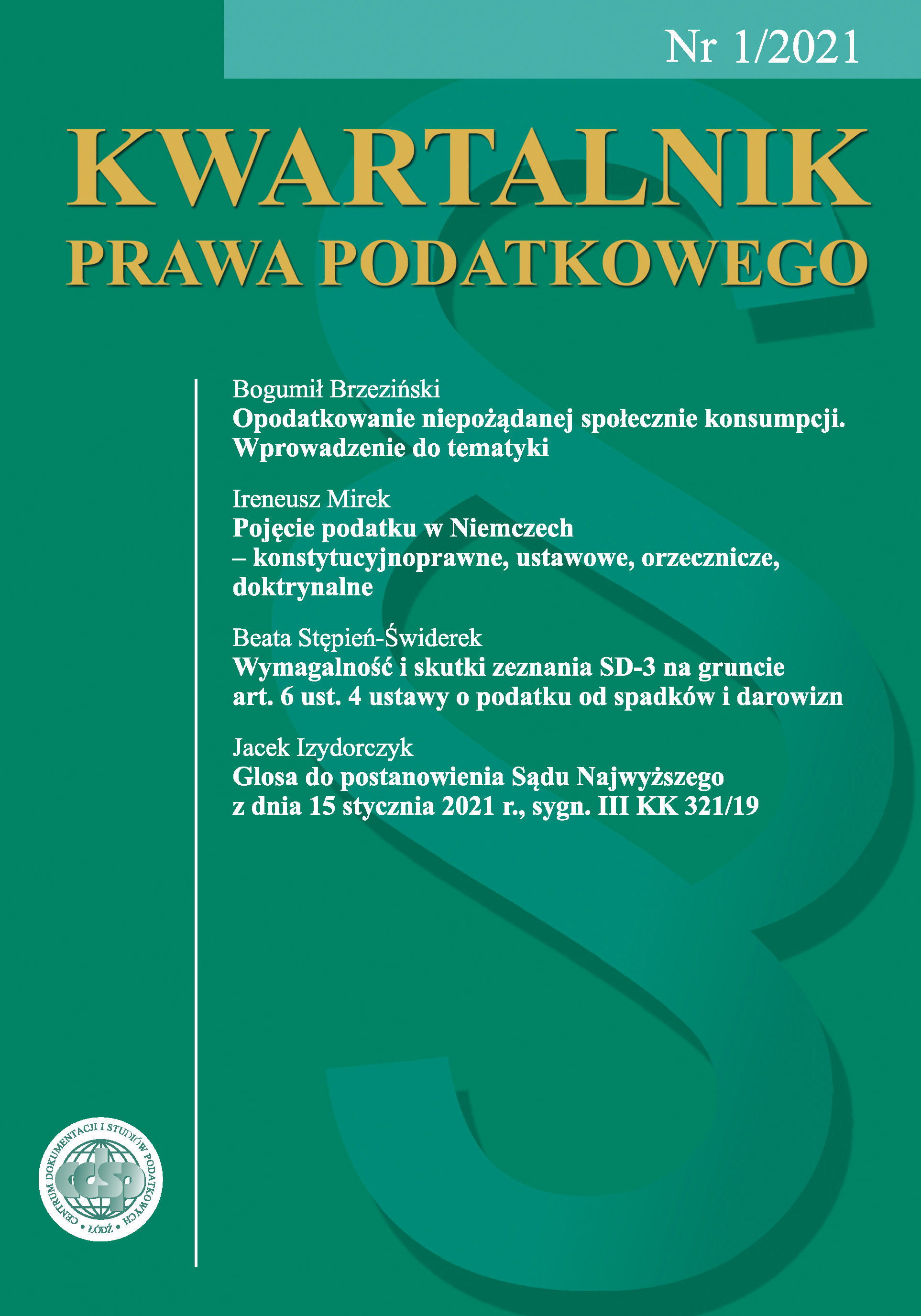Pojęcie podatku w Niemczech –konstytucyjnoprawne, ustawowe, orzecznicze, doktrynalne
DOI:
https://doi.org/10.18778/1509-877X.2021.01.02Słowa kluczowe:
podatki, daniny publiczne, pojęcie podatku, Niemcy, Republika Federalna NiemiecAbstrakt
Ustawa zasadnicza RFN z 1949 r. nie zawiera definicji podatku. Federalny Sąd Konstytucyjny prezentował początkowo tezę o recepcji tradycyjnego, czysto fiskalnego pojęcia podatku z Ordynacji podatkowej Rzeszy z 1919 r. na potrzeby ustawy zasadniczej. Później sąd za „podatki w sensie konstytucyjnoprawnym” uznawał także podatki o charakterze sterującym czy stymulującym, co wywołało dyskusję w doktrynie, a z czasem korektę definicji ustawowej w nowej Ordynacji podatkowej od 1977 r. Swoje definicje tworzy też doktryna. Praktyczne znaczenie definicji ustawowych i doktrynalnych jest ograniczone. Najważniejszą rolę pełni pojęcie konstytucyjnoprawne, którego treść decyduje o rozdziale kompetencji finansowych między federacją a krajami związkowymi, a więc o podziale realnej władzy w państwie federalnym.
Pobrania
Bibliografia
Birk D., § 3 AO, [w:] W. Hübschmann, E. Hepp, A. Spitaler, Kommentar zu AO und FGO, Köln (zbiór wymiennokartkowy).
Google Scholar
Birk D., Steuerrecht I, Allgemeines Steuerrecht, München 1988.
Google Scholar
Duden Deutsches Universal Wörterbuch, red. G. Drosdowski, Mannheim–Leipzig–Wien–Zürich 1989.
Google Scholar
Knies W., Steuerzweck und Steuerbegriff, München 1976.
Google Scholar
Kruse H.W., § 3 AO, [w:] K. Tipke, H.W. Kruse, AO, FGO Kommentar, Köln (zbiór wymiennokartkowy).
Google Scholar
Kruse H.W., Lehrbuch des Steuerrechts, Allgemeiner Teil, t. 1, München 1991.
Google Scholar
Leisner W., Von der Verfassungsmäßigkeit der Gesetze zur Gesetzmäßigkeit der Verfassung – Betrachtungen zur möglichen selbständigen Begrifflichkeit im Verfassungsrecht, Köln 1964.
Google Scholar
Mattern G., Der Begriff der Steuer und das Grundgesetz, „Betriebs-Berater” 1970.
Google Scholar
Maunz T., Art. 104a – 105 GG, [w:] T. Maunz, G. Dürig, R. Herzog, R. Scholz, GG-Kommentar, München (zbiór wymiennokartkowy).
Google Scholar
Mayer O., Deutsches Verwaltungsrecht, Leipzig 1895.
Google Scholar
Mirek I., Daniny publiczne w prawie niemieckim, Warszawa 1999.
Google Scholar
Müller K., Steuerbegriff des Grundgesetzes, „Betriebs-Berater” 1970.
Google Scholar
Selmer P., Steuerinterventionismus und Verfassungsrecht, Frankfurt am Main 1972.
Google Scholar
Selmer P., Zum Steuerbegriff im Entwurf einer AO, „Betriebs-Berater” 1972.
Google Scholar
Starck Ch., Überlegungen zum verfassungsrechtlichen Steuerbegriff, [w:] Festschrift für G. Wacke, Köln 1972.
Google Scholar
Stern K., Staatsrecht der Bundesrepublik Deutschland, t. 2, München 1980.
Google Scholar
Tipke K., Lang J., Steuerrecht, Köln 1994.
Google Scholar
Vogel K., Grundzüge des Finanzrechts des Grundgesetzes, [w:] Handbuch des Staatsrechts, t. 4, red. J. Isensee, P. Kirchhof, Heidelberg 1990.
Google Scholar
Vogel K., Walter H., Art. 105 GG, [w:] Bonner Kommentar zum Grundgesetz, Heidelberg (zbiór wymiennokartkowy).
Google Scholar
Wacke G., Das Finanzwesen der Bundesrepublik Deutschland, Köln 1950.
Google Scholar
Wendt R., Finanzhoheit und Finanzausgleich, [w:] Handbuch des Staatsrechts, t. 4, red. J. Isensee, P. Kirchhof, Heidelberg 1990.
Google Scholar
Opublikowane
Jak cytować
Numer
Dział
Licencja

Utwór dostępny jest na licencji Creative Commons Uznanie autorstwa – Użycie niekomercyjne – Bez utworów zależnych 4.0 Międzynarodowe.
PlumX metrics









